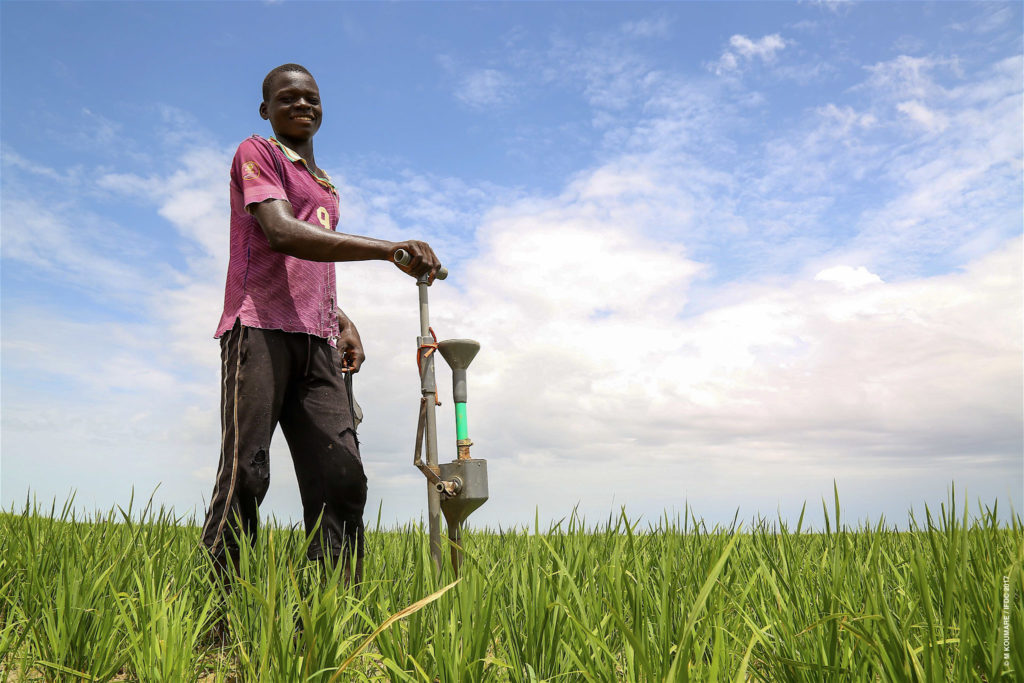
The virtual consultations held by the Economic Community of West African States (ECOWAS) on April 25-27, 2023, with the private sector, civil society, and public sector actors on improving soil fertility and agricultural productivity in West Africa ended on a positive note.
The consultations were organized with technical and financial support from the World Bank and the International Fertilizer Development Center (IFDC), through the Feed the Future Enhancing Growth through Regional Agricultural Input Systems (EnGRAIS) Project for West Africa, funded by the U.S. Agency for International Development (USAID). Stakeholders, intergovernmental organizations (ECOWAS, West African Economic and Monetary Union [UEMOA], and the Permanent Interstate Committee for Drought Control in the Sahel [CILSS]), and their member countries were mobilized to contribute to the development and adoption of a specific regional agenda that includes performance indicators on soil fertility and health for the benefit of all countries in the region.
During the workshops, 12 actions were identified: six regarding policies, three supporting access to fertilizers, two concerning agronomy, and one pertaining to knowledge sharing.
These actions include enhancing and promoting local agricultural production, increasing and supporting the local production of fertilizers, strengthening the monitoring of soil conditions and providing appropriate recommendations, sensitizing decision-makers and stakeholders on the need to restore soil fertility, and coordinating the monitoring of fertilizer use.
It will also be necessary to ensure an adequate supply of fertilizers to ECOWAS countries, strengthen the financial and operational capacities of agro-dealers, improve the availability and accessibility of inputs, and enhance the effectiveness of fertilizer subsidy programs.
Finally, it will also be important to strengthen the regional regulatory framework on fertilizer control and quality, update and strengthen the regional tax regulations on fertilizer trade, and promote complementary inputs through extension services.
The recommendations from the consultations will be recorded in a roadmap that will be discussed at the high-level ministerial meeting that the ECOWAS Commission will hold May 30-31, 2023, in Lomé, Togo, with support from the World Bank.
Despite the efforts made and the progress achieved since the African Fertilizer Summit held in Abuja, Nigeria, in June 2006, agricultural productivity is still insufficient on the African continent. Fertilizer use remains at low levels, far from the target of 50 kilograms of nutrients per hectare. This has resulted in a heavy reliance on food imports and a continuous increase in the number of food-insecure and hungry people since 2010, all in the context of increasing poverty, climate change, and declining soil fertility.
###
For further information, kindly contact:
Directorate of Communication, ECOWAS Commission
Telephone: +234 8025560095
About ECOWAS
ECOWAS was established when the ECOWAS Treaty was signed by 15 West African Heads of State and Government on May 28, 1975, in Lagos, Nigeria. The ECOWAS region spans an area of 5.2 million square kilometers. The Member States are Benin, Burkina Faso, Cabo Verde, Côte d’Ivoire, The Gambia, Ghana, Guinea, Guinea Bissau, Liberia, Mali, Niger, Nigeria, Sierra Leone, Senegal, and Togo.
Considered one of the pillars of the African economic community, ECOWAS was set up to promote cooperation and integration, leading to the establishment of an economic union in West Africa to raise the living standards of its peoples, and to maintain and enhance economic stability, foster relations-among Member States, and contribute to the progress and development of the African continent.
In 2007, the ECOWAS Secretariat was transformed into a Commission. The Commission is headed by the President, assisted by a Vice President, and Five Commissioners, comprising experienced bureaucrats who are providing the leadership in this new orientation. As part of this renewal process, ECOWAS is implementing critical and strategic programs that will deepen cohesion and progressively eliminate identified barriers to full integration. In this way, the estimated 300 million citizens of the community can ultimately take ownership for the realization of the new vision of moving from an ECOWAS of States to an “ECOWAS of the People: Peace and Prosperity to All” by 2050.
About IFDC
IFDC is a public international organization active in 20 countries in Africa, Asia, and America. IFDC uniquely approaches the global issues of food security and poverty by bridging the gap between research and impact, combining science-based innovations, holistic market systems development, an enabling policy environment, and strategic partnerships to assist farmers and countries to identify and scale sustainable agricultural solutions, including improved nutrient use efficiency. These approaches are needed to boost soil health and crop productivity while reducing the environmental impact of fertilizer use. IFDC translates research into action by using locally driven, environmentally sound, and impact-oriented solutions. With our partners, we seek to close the yield gap, eradicate global hunger, safeguard the soils on which our lives depend, and generate economic resilience for farming households and the countries in which they live.




